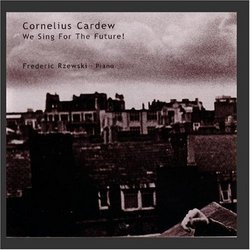Magnificent piano power in solidarity with a fallen comrade
scarecrow | Chicago, Illinois United States | 12/20/2001
(5 out of 5 stars)
"While returning to his home on Leighton Park Road,London in December 1981 Cornelius Cardew was struck by a hit 'n run driver. The circumstances surrounding his death,indeed murder, are rather opaque in that the driver of the auto has never been apprehended.And there was no witnesses, at least not any who have provided usefull clues. Cardew had layed in the cold, in the street for hours before he was discovered. And if the weather had been warmer, the situation may have been very different.Cardew once avant-gardist composer of graphic/conceptual works, as "Treatise" abandoned those endeavors and turned to Marxist activism, caught in the Anti-Vietnam and May,late Sixties rebellions in Europe. The last year of his life he was working with the various Indian, Pakistani families and was actually learning to speak their various dialects.He also was homeless for a time, living in a train station, that he maintained, and had been arrested for his activities in Camberwell. At the time prior to his death, Cardew had been organizing demonstrations against the growing right wing in London, The National Front, where firebombings of innocent working people's homes had been occuring with greater frequency. Recall the Brixton riots in London condemning the growing racism in London was soon to occur."We Sing for the Future" is a piano solo written the last year of his life 1981, in a somewhat Schubertian language, with refernces to early English piano music of William Byrd,John Bull,and the Fitzwilliam Virginal Book,a musical language exhibiting a directness,one of immediate communication.Cardew's abandonment of the avant-garde, the Post-Cage universe of purposless purpose was the growing exhibited elitism,and an indifference to the real problems of political struggle and culture.He turned to obvious,base accessible musical forms uncompromisingly. In this way the function of the music served political activist ways,there extending the focus of deeply historical social and political implications.
He felt the art of piano transcriptions or arrangements of Irish and Chinese revolutionary songs to be an interesting aesthetic focus and as a real supplement toward education of Left cultures.Music remained now simply another means, not a central focus to his creativity.
Cardew's piano writing was always a seminal means in his art. High levels of sophisticated ornamentations,rolled chords elegant clusters, and timbres as in his "February Pieces",for example had now adapted itself wonderfully toward this new unique political repertoire of works.Many of his primary works prior to this political period was for piano solo, as the "Three Winter Potatoes",and three piano "Sonatas", the 'Third Sonata' refurbishing the Boulezian language with a degree of originality. Much of the music he wrote during this period, 1972 to 1981 had this directly functional value and purpose,music intended to be played at worker gatherings, meeting halls, fundraisers,or cultural events.Rzewski here adds an improvisatory section toward the end, much like a development/commentary,and admirably explores dark anguished penumbral dimensions of this rather simple,uplifting heartfelt tune that Cardew wrote.So we hear Cardew's complete work with Rzewski's appendations.
As pianist Rzewski has no equals in improvisatory prowess,never turning back on the global visions of the work, exploring what he had played, turning, returning, re-constituting the materials with further musical commentary. The lamenting power Rzewski imparts here is indeed a compelling content powerfully overwrought moments of extremes of virtuosity very similar to Busoni,Listz or Beethoven.The inclusion here of the 'Thaelmann Variations' is yet another example toward this functional/educative music in the service of a political cause. The work a rigid set of variations after a known "lied" pastoral opeining the work with beautifully unencumbered rolled chords.
The work was written to commemorate the 30th anniversary of the death of Ernst Thaelmann, leader of the German Communist Party from 1927 until his death in the Buchenwald concentration camp in 1944.
The more militant sections of these variations utilizes Hanns Eisler's "Heimliche Aufmarsch"(1927) on the secret gathering of troops. There is also another quote from Charles Koechlin's "Bandar Log" in the more violent variations here. These are followed by more lyrical,melodramatic variations. One striking variation is of softly gentle repeated chords for one hand only. The variations ends in a rousing-like tonal excursion into traditional materials of ascending/descending chords,and scales to maximize the positive dimensions of the struggle Cardew had conducted with his own life and for the benefit of others."


 Track Listings (7) - Disc #1
Track Listings (7) - Disc #1